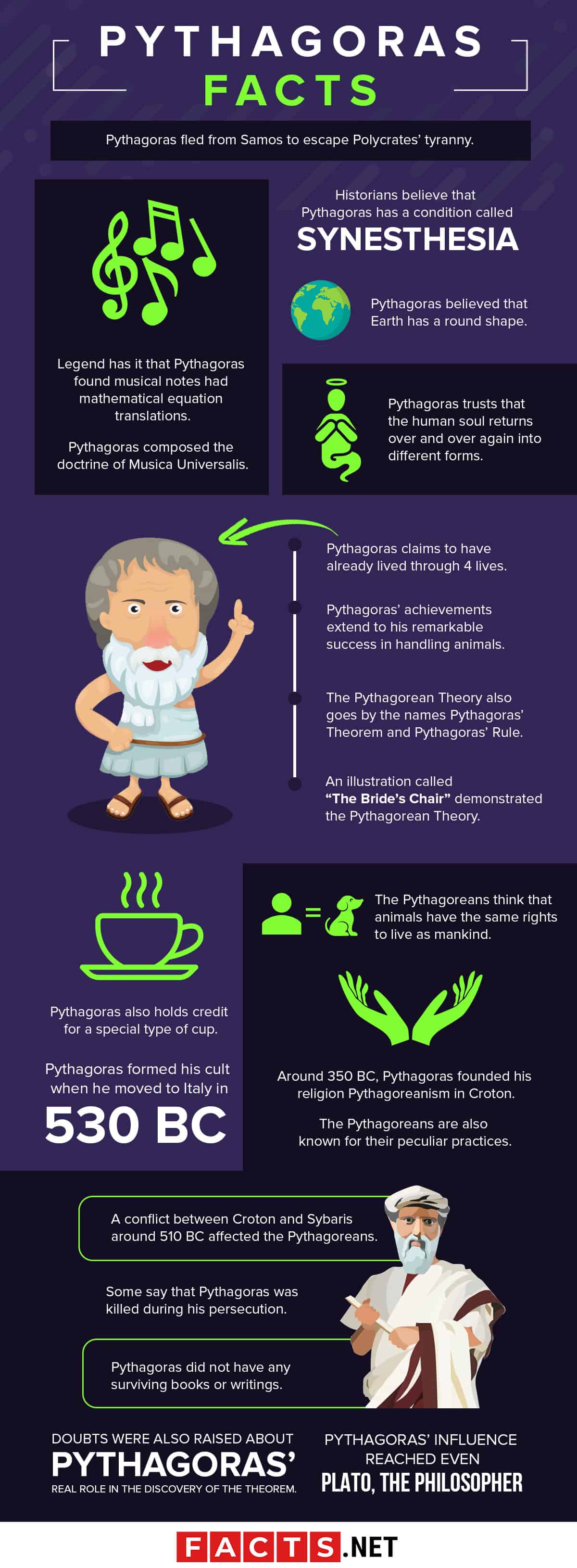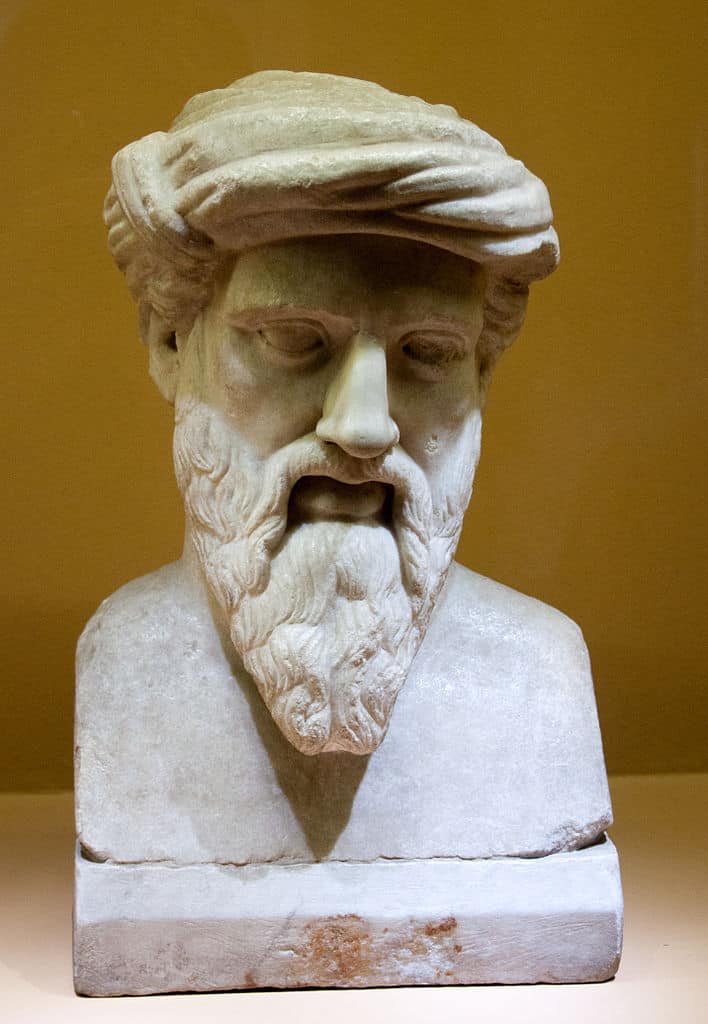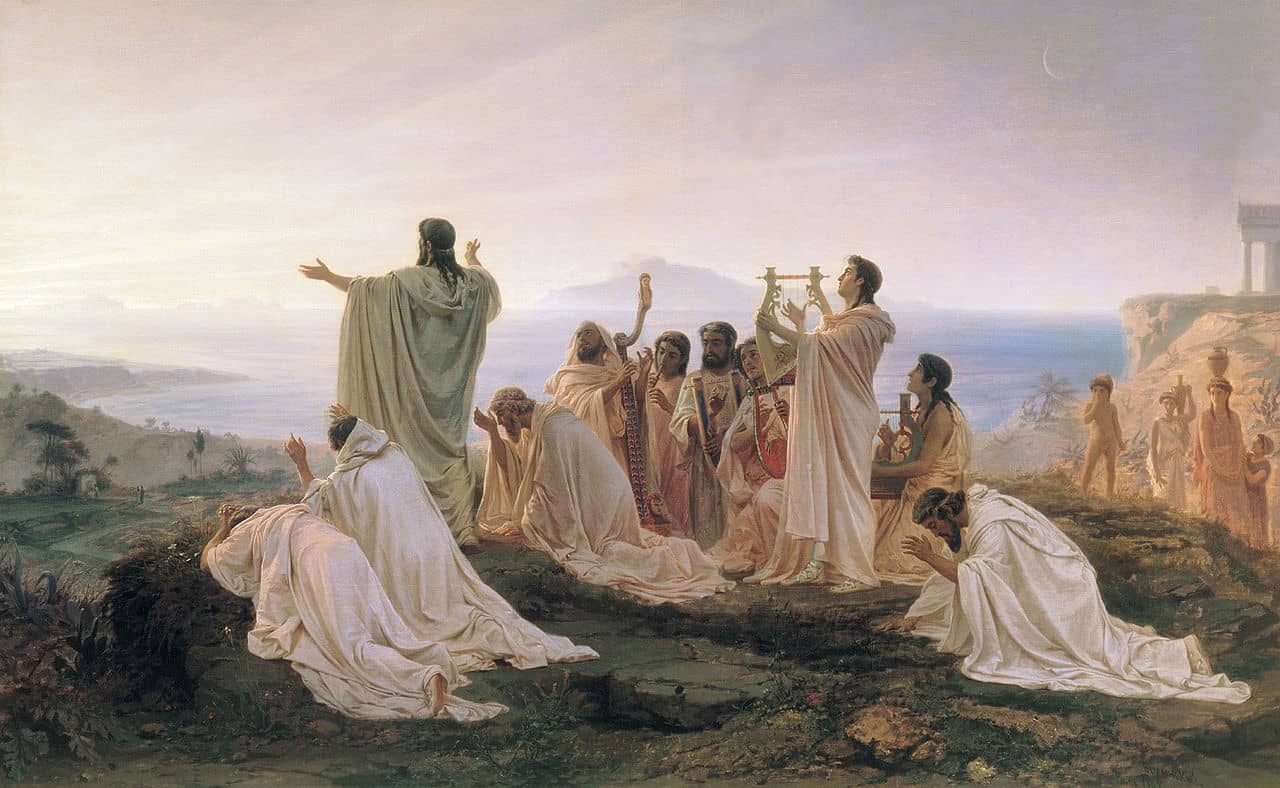
Aside from the infamous formula a2 + b2 = c2, what else do you know about the Greek mathematician Pythagoras? Here are some Pythagoras facts that you should learn about the exceptional mathematics legend. You always hear his name in math class, so it’s just right getting to know him more!
- Pythagoras was a mathematician and philosopher from Ancient Greece.
- Around 570 BC, Pythagoras was born on Samos, a Greek Island.
- He was the son of a seal engraver named Mnesarchus.
- The cause of his death around 496 BC remains to be a mystery.
- Pythagoras was best known for the Pythagorean theory.
- Pythagoras was born into the Ionian tribe, among the four of Ancient Greece.
- Pythagoras’ fundamental contributions to modern philosophy date back to the late sixth century BC.
- Aside from philosophy and mathematics, Pythagoras also had a hand in science and religious mysticism.
- Pythagoras was also believed to be a vital character in music, medicine, divination, and astronomy.
- Even ancient Greek art also had imprints from Pythagorean ideation on mathematical supremacy.
- Pythagoras had a cult.
- His religious and political views later led to the persecution of his followers.
- Pythagoras believed that science and religion have a connection.
- Pythagoras was the first man to divide the earth into 5 climatic zones.
- Middle Platonists in the first century BC bore a major revival on Pythagorean teaching. It harmonised with the emergence of Neopythagoreanism.
- Aristotle hailed Pythagoras as a supernatural being, more like a divine figure.
- Pythagoras was the first to proclaim his being a philosopher, meaning a “lover of ideas.”
- Scholars believe that ancient Babylonians and the Indians used the Pythagorean Theorem.
- Pythagoras as a great philosopher influenced famous scientists. Among those are Isaac Newton, Nicolas Copernicus, and Johannes Kepler.
- Pythagorean teachings, depicted in Metamorphoses by Ovid, had a great impact on the rise of the vegetarian movement.
Pythagoras Facts Infographics

Pythagoras fled from Samos to escape Polycrates’ tyranny.

He reached the city of Croton which has engaged in favorable relations with his birthplace, Samos, for a long time. Croton was well-known for its doctors and athletes.
Historians believe that Pythagoras has a condition called synesthesia.
This condition gives an affected person the ability to see music, hear colours and associate scents with people’s names.
Pythagoras believed that Earth has a round shape.
He claimed that mathematics could define the physical world. Moreover, the mathematician formulated a 4-rowed triangular figure that adds up to 10. This design, he believed, is holy.
Pythagoras trusts that the human soul returns over and over again into different forms.
It could be back into people or animals, and even in vegetables. They call this belief metempsychosis, which means “transmigration of souls.” Besides, it holds the immortality of every soul, and how it enters a new body upon death.
Legend has it that Pythagoras found musical notes had mathematical equation translations.
One day at work, he passed blacksmiths and made the discovery upon hearing the sound of their hammers crashing against the anvils.
Pythagoras composed the doctrine of Musica Universalis.
This concept regards the movement of the planets are by mathematical equations. Hence, its resonance produces a symphony of music, albeit inaudible.
Pythagoras claims to have already lived through four lives.
Also, he affirms that he could remember all of them. Meanwhile, people believe that the mathematician-philosopher can travel through space and time. They also believe that he could converse with animals and plants.
Pythagoras’ achievements extend to his remarkable success in handling animals.
As recorded by Aristotle, the Ionian legend killed a deadly snake by biting it back when it attacked him.
The Pythagorean Theory also goes by the names Pythagoras’ Theorem and Pythagoras’ Rule.
The theory says that, in a right-angled triangle, “the square on the hypotenuse is equal to the sum of the squares on the other two sides.”
An illustration called “The Bride’s Chair” demonstrated the Pythagorean Theory.
Many consider it as the “foundation of Freemasonry”. It is also recognized as the 47th Problem of Euclid or Proof 1 (the first proof of two of Euclid).
Pythagoras also holds credit for a special type of cup.
This distinctive cup only works normally when the user sips from it. But, its contents would spill if one drinks rather too quick.
Pythagoras formed his cult when he moved to Italy in 530 BC.
This religious group that he established, the Pythagoreans, is secretive in nature. Among the little facts known about them is that they are vegetarians. They also did not own any possessions, and that they worshipped the god Apollo.
The Pythagoreans think that animals have the same rights to live as mankind.
Hence, they held the prohibition of eating animals. This, among other ideas, inspired the third and fourth century A.D. Neoplatonists. It also inspired their opinions on soul purification.
Around 350 BC, Pythagoras founded his religion Pythagoreanism in Croton.

His religious beliefs centered on the principle that mathematics relate everything to each other. Then, his followers held onto the same principles.
The Pythagoreans are also known for their peculiar practices.
For one, they should not eat beans as they should not stir fire using iron. They should never look into a mirror that had light shining on it, and they should not pick up any fallen objects.
A conflict between Croton and Sybaris around 510 BC affected the Pythagoreans.
After Croton’s victory, the Pythagoreans had a conflict with democracy supporters. It caused the burning of meeting houses for the Pythagoreans.
Some say that Pythagoras was killed during his persecution.
Others say that he escaped amidst the dispute and was able to flee to Metapontum. After the attack on the Pythagorean Society in 480 BC, Pythagoras starved himself to death in Metapontum.
Pythagoras did not have any surviving books or writings.
This phenomenon led to the belief that the mathematician taught his followers by speech. However, several incidents of forgery were detected centuries after his death.
Doubts were also raised about Pythagoras’ real role in the discovery of the theorem.
As the school was immensely secretive, classical historians questioned Pythagoras’ discoveries. They also questioned if he was the right person for whom to give the credits. Some thought of possibilities that maybe his colleagues or their successors were the real achievers.
Pythagoras’ influence reached even Plato, the philosopher.
Like the mathematician, Plato also believed that mathematics has an impact on philosophy. More of the extensions of his influence is the founding of the Freemasons and other secret orders.
Apart from Plato’s clear interest in Pythagoreanism, he also has a reticent curiosity about Pythagoras.
However, the philosopher only mentioned the mathematician by name once in all of his writings. Plato only told of how Pythagoras gained his followers’ affections to an extreme degree by teaching them a certain way of life, known to this day as Pythagorean.
Alcmaeon, a great medical theorist of the ancient times, was also said to be one of his pupils.
These people practiced Pythagoras’ instituted religious beliefs. They also analysed his philosophical theories.
Ancient Greek scientist and philosopher Aristotle wrote about the Pythagoreans.
He explained how important mathematics was to the group. He also explained their belief in the relation between the principles of math and everything in the world.
Many assumed that Pythagoras as a young man has had extensive travels. It is the custom of most accomplished Greek philosophers and researchers.
They suspected that the young mathematician left the Samos island for Egypt. He then traveled to Africa and other places that the Mediterranean encompasses.
Some modern scholars are not in favor of the education and influence of Pythagoras.
Still, they accepted the fact that the mathematician went to Croton in 530 BC wherein he established his school. He swore novices to secrecy, and altogether lived a communally frugal lifestyle.
Pythagoras’ accomplishments are basically composed of credits.
Among the many things credited to his name are several mathematical and scientific principles. Some of those are the Pythagorean tuning, the Theory of Proportions, the five regular solids, the Earth’s sphericity. He also identified the planet Venus apart from the morning and evening stars.
Greek theologian and philosopher Xenophanes suggested that Pythagoras taught the doctrine of transmigration.
Xenophanes recorded how the mathematician once heard a dog’s howl appealing to its master not to beat it. He also recognised a departed friend’s voice.
The Pythagorean Society later progressed as the main scientific school of Greece.
This advancement pairs with how the Pythagorean science traces its origins back to early 5th century and to the founder himself.
The ancient Greek historian Herodotus described Pythagoras as “by no means the weakest sophist of the Hellenes.”
To this date, this title does not intend to mean any belittlement but rather implies scientific studies.
Greek Astronomer Heraclides claims that Pythagoras was the first person who discerned the “three lives.”
It refers to the Theoretic, the Practical, and the Apolaustic. Aristotle even made us of the last one in the Ethics.
Was this page helpful?
Our commitment to delivering trustworthy and engaging content is at the heart of what we do. Each fact on our site is contributed by real users like you, bringing a wealth of diverse insights and information. To ensure the highest standards of accuracy and reliability, our dedicated editors meticulously review each submission. This process guarantees that the facts we share are not only fascinating but also credible. Trust in our commitment to quality and authenticity as you explore and learn with us.


